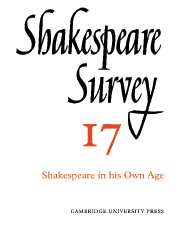Book contents
- Frontmatter
- THE DAILY LIFE
- 1 London and the Court
- 2 Provincial Life
- 3 Sailors and the Sea
- 4 Elizabethans and Foreigners
- 5 Education and Apprenticeship
- 6 The Law and the Lawyers
- 7 London’s Prisons
- PHILOSOPHY AND FANCY
- 8 The Commonwealth
- 9 Dissent and Satire
- 10 Scientific Thought
- 11 Medicine and Public Health
- 12 The Folds of Folklore
- 13 Symbols and Significances
- ART AND ENTERTAINMENT
- 14 Actors and Theatres
- 15 The Printing of Books
- 16 Music and Ballads
- 17 The Foundations of Elizabethan Language
- Notes
- Index
- Plate section
12 - The Folds of Folklore
Published online by Cambridge University Press: 28 March 2007
- Frontmatter
- THE DAILY LIFE
- 1 London and the Court
- 2 Provincial Life
- 3 Sailors and the Sea
- 4 Elizabethans and Foreigners
- 5 Education and Apprenticeship
- 6 The Law and the Lawyers
- 7 London’s Prisons
- PHILOSOPHY AND FANCY
- 8 The Commonwealth
- 9 Dissent and Satire
- 10 Scientific Thought
- 11 Medicine and Public Health
- 12 The Folds of Folklore
- 13 Symbols and Significances
- ART AND ENTERTAINMENT
- 14 Actors and Theatres
- 15 The Printing of Books
- 16 Music and Ballads
- 17 The Foundations of Elizabethan Language
- Notes
- Index
- Plate section
Summary
'Fables and antique toys'
When we are considering the treatment of folklore and of supernatural traditions in Shakespeare's plays we are almost forced to attempt some exploration of the atmosphere in which his childhood was passed.
Indeed, if we could discover all the stories, rhymes, songs and games known to the poets in their nurseries, we should know much more of their art and minds than we do now. Few of us can recall so translucent a childhood as Traherne's, but for most of us some scenes and stories have a special power, and kindle a glow in the mind which nothing but memories of childhood can light. It may be that childhood is not the happiest time in a man's life; if joys are keen, grief is often at that time most helpless and insupportable. Children are specially liable to fear, and are defenceless against grown-up exploitation, and the uncomprehended assault of grown-up emotions; but in spite of that, the senses are so brilliantly perceptive in childhood, and sense and emotion move together so harmoniously, that childhood is commonly remembered as a golden age, even in times when children suffered more hardships than they do at present. The poet's mind is more open to his childhood than that of the average man; and many recurrent symbols of this poet or that might be traced back, if we had but the key, to some nursery rhyme or fairy tale of his early youth.
It is seldom that we can find an example of this so neat as that unconsciously provided for us by Richard Willis in his Mount Tabor. Willis was a Gloucester man, born the same year as Shakespeare, into the same burgess class, and not far removed from him in locality. A part of the following passage was quoted by E. K. Chambers to illustrate the way in which the travelling companies arranged their performances.
- Type
- Chapter
- Information
- Shakespeare Survey , pp. 167 - 179Publisher: Cambridge University PressPrint publication year: 1964

